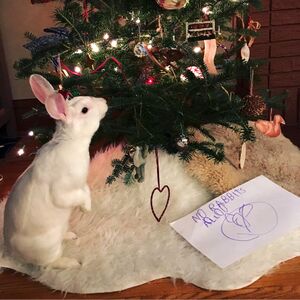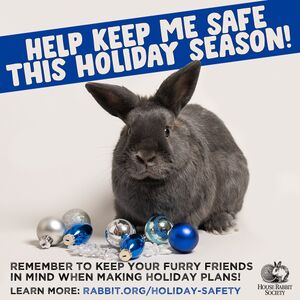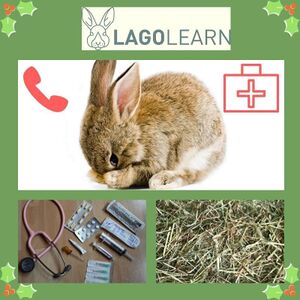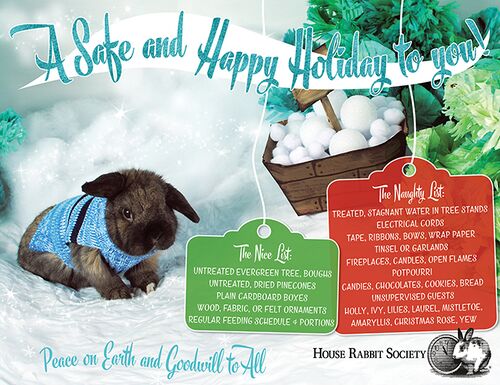Holidays
Holiday Safety by Dr. Schommer
Dr. Schommer shares high-quality, evidence-based information about exotic companion mammals on her personal Faceboook blog page. She is a member of the Minnesota Veterinary Medical Association (MVMA), American Veterinary Medical Association (AVMA), and the Association of Exotic Mammal Veterinarians (AEMV). Below is her post on Holiday Safety.
Posted on: November 13th, 2021
As we approach the holidays, now is a good time to consider how your decorations, schedule changes, and activities could affect your smallest pets. Here are a few things to keep in mind that will help your small mammals get through the holidays safe and sound:
1) Drafts. 'Tis the season for cold temperatures, and some small mammals are very sensitive to exposure to drafts. Avoid having cages near drafty windows or doors that open to the outside of the home. Species especially sensitive to cold temperatures include rats (especially those with underlying murine respiratory disease complex) and hedgehogs (who should have heat support on their cages at all times, but especially in the winter).
2) Weird plants. We bring all sorts of different plants into our homes over the holidays. Christmas trees, poinsettias, mistletoe, and potted plants that spend the summers outdoors all enter our living spaces in the winter. Most of the common decorative winter plants are not toxic to small mammals per se (even poinsettias.... they really aren't that bad, even for cats and dogs), but ingestion of any novel plants has the potential to throw off the delicate GI microflora that keeps gut function nice and normal. Pine needles can injure the soft tissues inside the mouth. Christmas trees may be sprayed with flame retardants or other chemicals; choosing an organic tree helps reduce the risk of chemical exposure, but ideally you should prevent your pet from chewing on the tree altogether.
3) Sweets! The number of sweet treats in our homes increases exponentially over the holidays, and so to do the opportunities for our pocket pets to ingest them. Whether unintentionally (the bunny finding and digging into the box of chocolates wrapped under the tree) or intentionally (the well-meaning guest giving a bite of cookie to a begging rat), refined sweets are a common trigger for GI stasis. Ingestion of small amounts of sweets is usually safe, but it's ideal to have some GI support such as probiotics, Oxbow's digestive support treats, or Critical Care on hand just in case. If your pet has ingested a large amount of sweet foods, it's best to call your vet for guidance. And of course, make sure you know which emergency vet you should call if your pet gets into trouble outside of your veterinarian's regular business hours.
4) Salt dough ornaments. I've seen more awareness of the toxicity of salt dough for cats and dogs in the past few years, but I would expect salt dough to be equally toxic to rabbits or other small mammals. Patson and Sladky (full citation at the end of this post) wrote a case report of a rabbit with sodium toxicity after a Himalayan salt lamp was added to his cage. Presenting signs were primarily neurologic (ataxia, rolling, head tilt, abnormal mentation), which is typical for what we know occurs with sodium toxicity in dogs and cats. I would use caution having salt dough ornaments in reach of any small mammals.
5) Smelly things. Scented candles, essential oil diffusers, and Glade plug-ins can be irritating to the respiratory tracts of small mammals. Remember that their sense of smell is significantly more sensitive than ours! Keep these scented decorations to areas of the house less commonly frequented by your pocket pets.
6) Clothing. Shirts, coats, and costumes are darling for a quick photo op if you have a tolerant pocket pet, but never leave clothing on them for long periods of time. Ingestion of cloth or yarn can cause GI upset or obstruction, and pets who feel trapped in clothing can panic and injure themselves trying to escape.
7) Christmas light cords, ribbons, and other novelties. Many pocket pets, especially ferrets, are especially attracted to novelty. The appearance of lots of new items is great fun to pocket pets, but take care to continue pet-proofing any areas your pets have access to. It's easy to forget about wrapping cords from decorations that are only temporary, especially if it's been a long time since you originally pet-proofed your home. But know that your pets will find any places you forgot to pet-proof really quickly!
I hope this is helpful! Are there any other holiday hazards that I forgot to mention?
Resources used:
- Courtney Patson, Kurt K. Sladky, Sodium intoxication in a domestic rabbit, Journal of Exotic Pet Medicine, Volume 35, 2020, Pages 114-116, ISSN 1557-5063, https://doi.org/10.1053/j.jepm.2020.09.005.
HRS: Help keep me safe. 🎄
From the House Rabbit Society post (Dec-16-2022): Keep your furry friends in mind when making holiday plans to ensure everyone is safe and happy. No one wants to make an unexpected trip to the vet! Learn more about keeping your rabbit safe this holiday season🎄✨
- 🎄 Beware of toxic flowers and plants. Amaryllis, holly, ivy, and mistletoe are common holiday plants that are toxic to rabbits. To be extra safe, keep ALL plants and fresh green decorations up and out of your bunny’s reach. Despite common perception, poinsettia isn’t poisonous to rabbits. (That’s not to say your bunny should eat poinsettia, since it can cause mild intestinal discomfort, but it shouldn’t cause serious illness.)
- 🎄 Be mindful of what’s at bunny level. Low-hanging decorations, electrical cords, and holiday lights look inviting to rabbits looking for something delicious to nibble! Ingested ornaments can cause intestinal blockage or even toxicity. Keep any homemade ornaments, particularly those made from salt-dough or other food-based materials, out of reach. For ornaments at bunny level, use safe plastic or wooden ornaments that a rabbit can safely tug, nibble, or even steal.
- 🎄 If your tree has been treated with fire retardant, pesticides, or fake snow, block it off so your rabbit can’t chew it. Place an x-pen around the tree or use the pen to section off the part of the room where the tree is so your bunny can’t go near it.
- 🎄 If you put up electrical decorations during this season, make sure the cords are well out of your rabbit’s reach. Plastic wire protectors may help slow down a very curious bunny. However, the plastic wire wrap won’t necessarily prevent a determined rabbit from chewing through it to the wires. After wrapping the cords in the wire wrap, you should still tuck them away.
- 🎄 If you have guests who are particularly interested in visiting your rabbit, don’t allow them to handle the rabbit without first properly instructing them about safe handling. Let visitors know that a rabbit’s digestive system is very delicate, and they should only eat food intended for rabbits – no human holiday treats!
Source: https://rabbit.org/holiday-safety/
RWAF: Are festive plants toxic to rabbits? 🎄
From The Rabbit Welfare Association and Fund post (Dec-14-2021):
Christmas is a time when we adorn our houses with many outdoor winter plants, but are these safe for rabbits?
- 🎄 Holly (particularly the berries) is very toxic to rabbits and should definitely be kept out of reach.
- 🎄 Mistletoe: It’s meant for smooching, not munching! Like holly, mistletoe is harmful to rabbits so make sure it’s kept where it should be – high up!
- 🎄 Poinsettias: Contrary to belief poinsettias are not actually toxic to rabbits, but the milk-like sap it produces can upset your buns’ tums, so it’s still advisable to keep these out of reach.
- 🎄 Pine needles: If you have a real Christmas tree, you’ll know what a pain (figuratively and literally) pine needles can be! But if you have free-range house buns, you might not want them rockin’ around the Christmas tree. Pine needles are mildly toxic and while they won’t cause any severe harm, they can cause irritation, discomfort, and possibly diarrhoea.
If your tree has been sprayed with any chemicals, such as fake snow, then this a big no no!
While most rabbits have a natural instinct when it comes to toxic plants, it’s always better to be safe than sorry, so please keep these plants out of reach from curious little ones.
LagoLearn: Prepare for the Holidays
From the LagoLearn Ltd. post (Dec-17-2021):
Are you prepared for the Christmas holiday?
- Make sure you know your vets opening hours AND their emergency contact telephone number. Also, find out where their emergency service is located and store a copy of the address and directions.
- Order and collect your pets medications! Make sure you have enough to see you right through until the new year.
- Stock up on food! Make sure you have enough of their normal food to last until the new year. This should include any fresh items they are used to eating (and try not to give too many treats as this can upset tummies).
- Calming products. Make sure you have some Pet Remedy or other calming products to help your pets cope at this stressful time of year. Also make sure they have a quiet, safe area they can go to that is away from visitors, potential seasonal dangers and remember that people often use fireworks on New Years Eve too.
- Keep them warm and dry. If your pets live outside then please don's forget about them this Christmas. They still need their normal amount of exercise. Also, make sure their enclosure is warm enough and not likely to flood.








